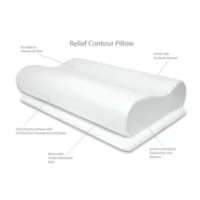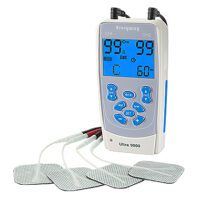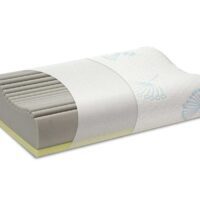Stiff Neck
Article by John Miller
Stiff Neck? Here’s What You Need to Know

A stiff neck is a common issue that can impact your daily life. Whether you’re experiencing sharp pain, dull muscular aches, headaches, or restricted movement, neck stiffness can be quite frustrating. Understanding the causes, treatments, and preventive measures can help you manage this condition effectively.
Causes of Neck Stiffness
There are numerous causes of neck pain and stiffness. Often, the discomfort is mild and stems from simple problems such as poor posture, muscle strain, or prolonged use of technology (commonly referred to as “text neck“). However, it’s crucial to recognise that some neck pain can indicate more serious conditions.
Common Causes Include:
- Poor Posture: Sitting or standing with improper alignment can strain neck muscles.
- Muscle Strain: Overuse or sudden movements can cause muscle tension.
- Text Neck: Prolonged use of smartphones or tablets, with the head bent forward, leads to muscle strain.
- Injury: Accidents or falls can cause whiplash or other neck injuries.
- Arthritis: Degenerative diseases can affect neck joints.
When Should You Be Concerned About Neck Pain?
Most neck pain is not severe. However, if you experience the following symptoms, consult your physiotherapist or doctor:
- Persistent pain lasting more than a week
- Severe pain without apparent cause
- Pain spreading to shoulders or arms
- Weakness or numbness in arms or hands
- Headache accompanied by neck pain
Diagnosing Neck Pain
Accurate diagnosis is essential for effective treatment. Your physiotherapist will perform a thorough assessment, which may include:
- Medical history review
- Physical examination
- Imaging tests like X-rays or MRIs
Treatment Options for a Stiff Neck
Once serious conditions are ruled out, most neck stiffness can be relieved with simple treatments. Here are some effective methods:
At-Home Remedies:
- Relative Rest: Avoid activities that strain your neck.
- Ice or Heat Therapy: Applying ice or heat can reduce inflammation and pain.
- Over-the-Counter Pain Relievers: Medications like ibuprofen can help manage pain.
Physiotherapy Treatments:
- Manual Therapy: Techniques to mobilise and manipulate neck joints.
- Neck Exercise: Strengthening and stretching exercises to improve neck stability and flexibility.
- Posture Training: Guidance on maintaining proper posture to prevent future issues.
Preventing Neck Stiffness
Prevention is better than cure. Here are some tips to avoid neck stiffness:
- Maintain Good Posture: Keep your head aligned with your spine.
- Take Frequent Breaks: Avoid long periods of sitting or using technology without breaks.
- Ergonomic Workspaces: Ensure your workstation promotes good posture.
- Exercise Regularly: Engage in activities that strengthen neck muscles.
What to Do Next?
If you’re dealing with a stiff neck, seeking professional advice from a physiotherapist can make a significant difference. They can provide a personalised treatment plan tailored to your specific needs, helping you relieve pain and prevent future issues.
Conclusion
A stiff neck, while common, can be effectively managed with the right approach. Understanding the causes, recognising when to seek help, and following preventive measures are key. If you’re experiencing persistent neck pain, consult your physiotherapist to ensure you receive the best care.
Stiff Neck FAQs
- What are the main causes of a stiff neck?
- Poor posture, muscle strain, text neck, injuries, and arthritis are common causes of a stiff neck.
- How can I relieve a stiff neck at home?
- Rest, ice or heat therapy, and over-the-counter pain relievers can help manage a stiff neck at home.
- When should I see a physiotherapist for neck pain?
- If your neck pain persists for more than a few days, is severe, or spreads to your shoulders or arms, consult a physiotherapist.
- Can poor posture cause neck stiffness?
- Yes, poor posture can strain neck muscles and lead to stiffness.
- What exercises can help prevent neck stiffness?
- Strengthening and stretching exercises, along with maintaining good posture, can help prevent neck stiffness.
- How does “text neck” contribute to neck pain?
- “Text neck” occurs from prolonged use of smartphones or tablets, leading to muscle strain from the forward head position.
Related Articles
- How to Improve Your Neck Posture
- Discusses simple steps to improve posture and prevent neck pain.
- Neck Pain Treatment Options
- Explains various treatment options for neck pain, including physiotherapy.
- Text Neck: Causes and Solutions
- Explores the impact of technology on neck health and how to mitigate it.
- Understanding Whiplash Injuries
- Provides insights into whiplash causes, symptoms, and treatments.
- Arthritis in the Neck
- Discusses the effects of arthritis on the neck and available treatments.
- How Physiotherapy Helps with Neck Pain
- Details how physiotherapy can alleviate neck pain and improve mobility.
- Managing Chronic Neck Pain
- Offers strategies for managing long-term neck pain.
- Ergonomics and Neck Health
- Highlights the importance of ergonomic workspaces in preventing neck stiffness.
- Manual Therapy Techniques for Neck Pain
- Explains various manual therapy techniques used to treat neck pain.
- Neck Strengthening Exercises
- Lists exercises to strengthen neck muscles and prevent stiffness.
These articles provide valuable information on related topics, helping readers explore further and manage their neck health effectively.






























































